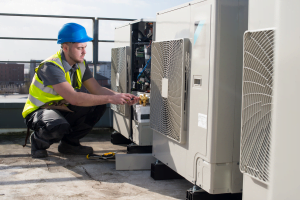Cool Careers: The Hot Demand for HVACR Professionals in New Jersey
Go Back To Previous PageFinding the right career path can be a lifelong journey. Some decide what they want to do right out of high school and stay on that path for decades. Others go to college to figure out where their interests lie. In many cases, working adults with a career decide to switch to a new industry later. There are many career opportunities worth pursuing for those looking for jobs in New Jersey. The construction industry experiences yearly growth, and one specific role is projected to grow around 9% between 2020 and 2030: HVACR Professionals.
out where their interests lie. In many cases, working adults with a career decide to switch to a new industry later. There are many career opportunities worth pursuing for those looking for jobs in New Jersey. The construction industry experiences yearly growth, and one specific role is projected to grow around 9% between 2020 and 2030: HVACR Professionals.
HVACR stands for heating, ventilation, air conditioning, and refrigeration. These systems are crucial in residential and commercial buildings; you can specialize in either field. Let’s dive into what this career can offer and how to approach it when living in New Jersey.
Strong Average Pay
The point of a career is to make money, and many people want salary stability. Fortunately, as an HVACR contractor in New Jersey, you can make a decent income relatively quickly. According to a report from Zippia, this state is considered the fourth best in the nation for HVAC technicians. This is based primarily on the average salary of around $75,000 annually.
quickly. According to a report from Zippia, this state is considered the fourth best in the nation for HVAC technicians. This is based primarily on the average salary of around $75,000 annually.
Although there is wide variation depending on your experience and how much work you can get, this is a solid place to start. Even the lowest earners in this field still make $46,000 or more, which may only be early in your career. The more experience you gain, the more you can make.
Clear Path to Licensing
Many who attend college for a four-year degree are not guaranteed to find a position in the field they are pursuing. This concern is much more minor for individuals seeking an HVACR career. The path to getting licensed and finding work is much more straightforward.
Several options can get you closer to your goal.
- Complete an apprenticeship and have one year as a journeyman
- A Bachelor’s degree from an HVACR institution plus one year as a journeyman
- A two-year degree from a trade school and completion of an apprenticeship, plus one year as a journeyman
If you have taken one of these paths, you can study for your NJ HVAC license and then pass the exam to become officially licensed in this state and start bidding on projects.
High Demand From Clients
HVACR contractors are in demand in New Jersey because many clients need that type of work. Property owners, both residential and commercial, need to keep their buildings operational, and most of them lack the expertise to handle heating, ventilation, air conditioning, and refrigeration repairs or upgrades.
Homeowners preparing to sell their properties often must invest in upgrades or repairs to their HVACR systems, which means plenty of work for you when the housing market is strong. With so many work opportunities, becoming an HVACR contractor is a reasonably reliable career path, and the longer you are in this business, the easier it will be to secure contracts.
Networking Opportunities to Become an HVACR Professional
Perhaps you are concerned about the nature of finding work as a contractor. There is a level of prospecting clients and marketing required to land jobs, which means relationships become very important. Fortunately. HVACR contractors can form vast networks relying on one specific resource: the real estate industry. Real estate professionals, such as inspectors, realtors, and investors, can all benefit from relationships with contractors.
A realtor helping someone sell a home can recommend a local HVAC contractor to help with repairs before the sale; check out Fusion Repair. If you are forming relationships with property investors, they may have numerous work opportunities for you on multiple properties. Building a network of mutually beneficial relationships with real estate professionals can make it much easier to find clients in the future so your pay remains consistent.
Is Becoming a New Jersey HVACR Contractor Right For You?
The market for this career path in New Jersey has a positive outlook. With growth projected to continue and high average pay, this could be the perfect path for your professional endeavors. First, you need to answer a few questions. Do you enjoy the work of an HVACR professional?
Are you prepared to pursue the educational and experiential requirements to get your license? Are you willing to learn marketing and prospect clients yourself? If you can answer yes to all those questions, then you might be the perfect candidate for a career in HVACR.


